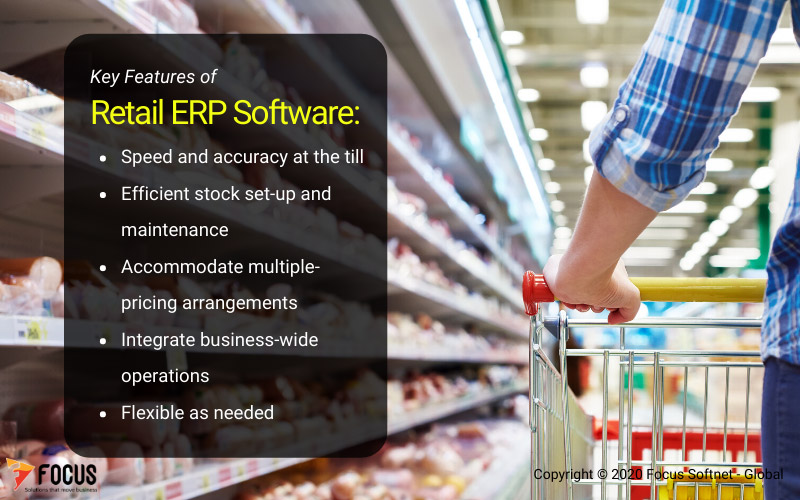However, this is possible only when these applications perform as promised. Let’s find out the areas that need to be scrutinized for recognizing whether or not your retail ERP software functions proficiently.
ERP for Retail Industry: What are the Key Requirements?
Data plays an important role in dealing with modern retail business needs. Its veracity, quick and easy accessibility influences your ability to respond to changes as they happen. So the key requirements in a retail ERP revolve around the factors that help you facilitate maximum utilization of data to instill seamless business procedures.
Speed and accuracy at the till
Speed and accuracy in data tracking are fundamental for optimizing your store’s performance. Indeed, at your retail store, you would want to scan each product quickly and allow generating error-free invoices.
Your ERP software for retail business is expected to standardize the processes involved. This even implies to dissimilar products put up for sale at multiple store outlets for different discount rates or offer schemes.

Efficient stock set-up and maintenance
Your retails store functions in an environment that requires dealing with numerous suppliers and large quantities of goods.
Ideal ERP for retail stores is meant to automatically import the inventory information, keep track of every goods movement in your warehouse and store. Further, the system also allows the setting of purchase maintenance levels, enabling you to stock products in advance.
Accommodate multiple-pricing arrangements
Your retail outlets require multiple pricing structures. The reason being, same goods sold at multiple locations are priced differently due to volume or value discounts, customized offers, supplier suggested retail prices and so on.
Your ERP software needs to incorporate all these into the pricing system, accommodating the scenario where you are able to immediately generate invoices consisting of multiple goods, sold at different prices at different store outlets.
Integrate business wide operations
Retail ERP systems are relied upon for keeping count on the sales happening at different store outlets and calculating the net revenue in real-time.
This specific requirement demonstrates the need for integrating both front-office and back-office operations into a centralized system. It provides you speedy access to the necessary information stored in the database for planning future business strategies.
Flexible as needed
The modern retail ERP system must be flexible in supporting your customers' needs. This includes flexibility in accepting payments through multiple channels, partial pay, credits and split bills.
Loyalty cards are now common practice and so your retail system requires to handle these schemes and manage full as well as partial redemption of vouchers without any issue.








